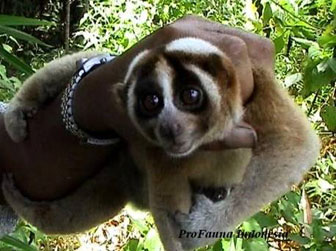Cuddly slow loris threatened by the pet trade
Cuddly slow loris threatened by the pet trade
mongabay.com
May 9, 2007
The slow loris, a big-eyed primate found in the rainforests of southeast Asia, is threatened by the international pet trade said ProFauna Indonesia, a wildlife activist group that has called for a ban on the illegal trafficking of the charismatic animal.
ProFauna Indonesia says the Indonesian government has failed to take serious steps to protect wildlife in the country, where trafficking of protected species is still common. It cites the slow loris as an example.
“Slow lorises are protected by law in Indonesia, based on a 1973 Agriculture Ministry decree, and further clarified by a 1999 government regulation on preserving flora and fauna species,” it stated, “[but] around 7,000 lorises have been caught and traded since 2000.”

Captive slow loris. Photo courtesy of ProFauna Indonesia |
ProFauna Indonesia says slow loris are usually sold for around $20 each in animal markets and shopping malls in major cities. The animal’s teeth are usually removed using pliers prior to sale and slow loris suffer high mortality in captivity due to infection, poor handling and animal cruelty.
The group is working with organizations to get the slow loris listed on Appendix I of CITES (Convention of International Trade of Endangered Species Fauna and Flora), a move that would further restrict their trade.
Related articles
Commercial hunting may be the biggest threat to tropical rainforests. Commercial hunting is decimating wildlife populations across the tropics and may be one of the gravest threats presently facing rainforests, reports a series of studies published in the May issue of the journal Biotropica. The research reveals that large-scale loss of wildlife is already affecting forest health and regeneration.
Human hunting causes changes in monkey behavior. Human hunting pressure causes significant behavioral changes in Central Africa monkeys and duiker according to a paper published in the March issue of the journal Biotropica. The research, conducted in southwestern Gabon and led by Barbara M. Croes of the Smithsonian Institution, found that “monkeys become more secretive when hunted” and use alarm calls at shorter distances, while duiker — small forest antelope — abandon their usual “freeze response” and rapidly flee when confronted by humans.
In Japanese